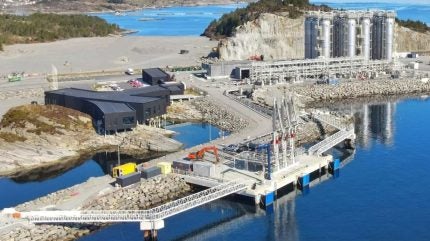
TotalEnergies, Equinor and Shell have completed the carbon dioxide (CO₂) receiving and storage facilities at the Northern Lights joint venture (JV) in Øygarden, Norway.
The Norwegian Minister of Energy officially opened the CO₂ transport and storage facility in Øygarden, near Bergen, on 26 September, after months of planning and building.
Equinor, Shell, and TotalEnergies have all collaborated on the Northern Lights facility.
According to a statement by Equinor, large-scale CCS will significantly impact the energy transition by providing a solution for large industrial emitters that are challenging to decarbonise.
Tim Heijn, managing director of the Norwegian Government’s Northern Lights JV, hailed the completion of the facilities “together with the people of our host municipality Øygarden, the Norwegian Ministry of Energy and key stakeholders, including policymakers and industry partners in the CCS chain”.
The Northern Lights project is a part of the Longship project, a full-scale CCS initiative in Norway.

US Tariffs are shifting - will you react or anticipate?
Don’t let policy changes catch you off guard. Stay proactive with real-time data and expert analysis.
By GlobalDataThis project involves capturing CO₂ from industrial sources and transporting the liquid CO₂ to the terminal in Øygarden. The liquefied CO₂ will then be conveyed through a pipeline to an offshore storage location beneath the seabed in the North Sea for secure and permanent capture.
The Norwegian Government supported the first phase, which has a capacity of 1.5 million tonnes (mt) of CO₂ per year, which customers in Norway and Continental Europe have fully booked. Studies are under way to expand the capacity to more than 5mt in the second phase.
Speaking as part of an official statement, Equinor CEO Anders Opedal said the completion of the Northern Lights facility “opens a value chain for [decarbonising] European industry and energy and shows the role we and our partners take in developing low-carbon solutions in the energy transition”.
The Heidelberg Materials cement factory in Brevik and the Hafslund Oslo Celsio waste-to-energy plant, which have a capacity of 800,000 tonnes annually, have been reserved.
According to a Shell Low Carbon Solutions head, “carbon capture and storage has a vital role to play in helping society achieve the goals of the Paris Agreement”.
Anna Mascolo added that besides attempts to prevent and decrease emissions, CCS will “play a crucial role in assisting our clients in reducing carbon emissions, especially in industries that are challenging to decarbonise”.
GlobalData research indicates that Europe has the second-largest CCS capacity in the world but still significantly trails North America.
The EU has established a clear framework, which includes initiatives like the EU Industrial Carbon Management Strategy, to support the development of this technology in the next decade. However, to achieve climate neutrality by 2050, the EU must be able to capture a substantial 450mt of CO₂ per year.



